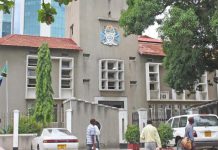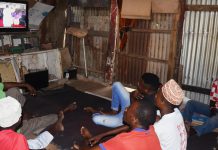Author: FAUSTINE KAPAMA
AfricaPress-Tanzania: THE Judiciary of Tanzania is massively investing in the use of Information and Communication Technology (ICT) to cope with the 21st century pace in conducting court sessions with a view to dispensing timely justice.
This was revealed by Chief Justice (CJ), Prof Ibrahim Juma, in Dar es Salaam on Friday at a function to admit 601 new High Court advocates online, being the first time in the country’s judiciary history.
“The use of ICT is inescapable. We have reached a situation where in the next few years, a lawyer who is not acquainted with ICT will have a difficult time in the discharge of his or her duty as an advocate in the High Court of Tanzania,” he told new members of the bar, among them, senior and judicial officers.
Prof Juma said before long, all cases would have to be registered and filed in Court online and the Electronic Filing Rules were already in use.
He pointed out that the Judiciary already had an electronic registration and coordinating system (JSDS2) since February 6, 2019.
“This JSDS2 system enables access to various aspects of case management like filing cases electronically and even being summoned to court or get case information via a text message (SMS),” the CJ noted.
The CJ recalled that the Covid-19 pandemic had forced the Judiciary of Tanzania to use ICT to ensure timely dispensation of justice.
“This is a good example of ICT benefits. As of July 8, 2020, a total of 3,874 cases were received through the Court’s network. Roaring success has been seen through videoconference sessions of cases involving parties who are in various prisons. During the Covid-19 alert all prisons were in lockdown,” he explained.
However, he said criminal cases and appeals involving remand prisoners and inmates had continued being heard through videoconferencing.
As of July 8, 2020, Prof Juma said 8,815 cases had been heard at various court levels through an ICT system.
According to him, such achievements have been realised after the Judiciary of Tanzania purchased ICT equipment and distributed them to 16 prisons. The ICT equipment includes 30 smart TV, 30 cameras, 30 laptops and 30 audio and video connectors.
“The total cost of the equipment is 230,018,661/40. These materials have been distributed to the prisons of Ukonga, Segerea, Mwanza, Tabora, Mtwara, Mbeya, Tanga, Musoma, Arusha, Moshi, Dodoma, Sumbawanga, Shinyanga, Iringa, Bukoba and Songea,” he explained.
The CJ was of the view that as rural areas were being electrified, Internet Court services would also be delivered in different parts of the country.
“It is hoped that legal aid will move in the same way, as ICT is used by the Judiciary of Tanzania.” Prof Juma pointed out all judicial officers must ensure they were well-acquitted with ICT. “Make sure the offices you open have the latest equipment to enable you to meet your clients through ICT before they arrive at your offices. Many of you are serious ICT users, it will be of great benefit in legal aid,” the CJ appealed to the advocates.
He also reminded them that the 21st century would be dominated by commercial transactions conducted electronically on the Internet and would require lawyers who were highly qualified ICT users.
Speaking at the same function, Attorney General (AG), Prof Adelardus Kilangi, advised the new advocates to continue learning to enhance their professional knowledge and capacity in serving their clients diligently.
He also appealed to them to adhere to professional ethics and refrain from any engagement in criminal conduct, like forging some documents, in particular, cases related to the administration of estates. Prof Kilangi further advised them to offer free legal aid to the poor.







